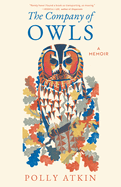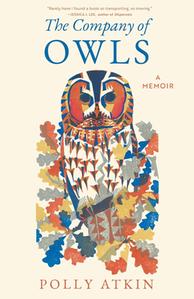
 Polly Atkin (Some of Us Just Fall) brings a poet's sensibility to a contemplative study of nature and self with her memoir The Company of Owls. From her home in the village of Grasmere in England's Lake District, Atkin can hear tawny owls calling to one another; on short walks, she feels privileged to watch them hunting, nesting, raising their young. During and after the Covid-19 lockdown, she marveled at their lives, so little known to us, and mused on isolation, companionship, humans' relationship to the rest of the natural world, and more. Not an ornithologist by training, Atkin feels drawn to her poorly understood subject, associated with both wisdom and death, night-dwelling but sun-loving: "This book is about owls, but it is also about me."
Polly Atkin (Some of Us Just Fall) brings a poet's sensibility to a contemplative study of nature and self with her memoir The Company of Owls. From her home in the village of Grasmere in England's Lake District, Atkin can hear tawny owls calling to one another; on short walks, she feels privileged to watch them hunting, nesting, raising their young. During and after the Covid-19 lockdown, she marveled at their lives, so little known to us, and mused on isolation, companionship, humans' relationship to the rest of the natural world, and more. Not an ornithologist by training, Atkin feels drawn to her poorly understood subject, associated with both wisdom and death, night-dwelling but sun-loving: "This book is about owls, but it is also about me."
Atkin, who lives with several chronic illnesses that limit her mobility and ability to work in traditional ways, found herself under lockdown questioning the nature of solitude and our many reactions to it. She made art of Middle English words for aloneness: uplokkid, reclused, onlihede, and solnes, which become chapter titles. "But the more times I wrote the words out, the more shades of meaning leached from my brushstrokes. The more ambiguous I felt my state of seclusion to be, the more ambiguous I felt about isolation." She related to what she perceives as the owls' need for both separation and togetherness. In her own insomnia, she connected to their apparent affinity for both darkness and light. "Without other humans to see you and claim you as theirs, you feel less and less like one of them, more and more likely something else. Something nocturnal. Something unbound." She watched a trio of owlets navigate siblinghood, and worked to resist what felt like anthropomorphism.
This is a classic memoir in its meditative pacing, thoughtfulness, and self-examination. And of course its author, with several volumes of poetry to her name, takes special care with both language and detail. The Company of Owls balances a careful focus on the hyperlocal owls immediately surrounding Atkin's home, and a survey approach to the history of owls in the region, the humans who study them, and the owls Atkin encounters online via friends and algorithms. Despite the easy assumption (as she notes) that "technology disconnects us from the world around us," Atkin benefits from a larger world of owls. That wider lens improves her view of what lies just beyond her own home: the Lake District's tawny owls, in their small movements, births, and deaths. Atkin's lovely, reflective memoir reminds all readers to slow down, listen, and find joy. --Julia Kastner, blogger at pagesofjulia
Shelf Talker: A poet and nature writer shares the grace, beauty, and lessons in her quiet observations of "my neighbours, the owls" in this loving memoir.

